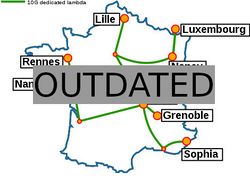Grid5000:Home: Difference between revisions
No edit summary |
No edit summary |
||
| Line 18: | Line 18: | ||
<br> | <br> | ||
Recently published documents and presentations: | Recently published documents and presentations: | ||
* [ | * [[Media:Grid5000.pdf|Presentation of Grid'5000]] (April 2019) | ||
* [https://www.grid5000.fr/mediawiki/images/Grid5000_science-advisory-board_report_2018.pdf Report from the Grid'5000 Science Advisory Board (2018)] | * [https://www.grid5000.fr/mediawiki/images/Grid5000_science-advisory-board_report_2018.pdf Report from the Grid'5000 Science Advisory Board (2018)] | ||
* Grid'5000 is merging with FIT to build the SILECS Infrastructure for Large-scale Experimental Computer Science. Read [http://www.silecs.net/wp-content/uploads/2018/04/Desprez-SILECS.pdf an Introduction to SILECS] (April 2018) | * Grid'5000 is merging with FIT to build the SILECS Infrastructure for Large-scale Experimental Computer Science. Read [http://www.silecs.net/wp-content/uploads/2018/04/Desprez-SILECS.pdf an Introduction to SILECS] (April 2018) | ||
Revision as of 18:42, 25 April 2019
|
Grid'5000 is a large-scale and versatile testbed for experiment-driven research in all areas of computer science, with a focus on parallel and distributed computing including Cloud, HPC and Big Data. Key features:
Older documents:
|
Random pick of publications
Five random publications that benefited from Grid'5000 (at least 2777 overall):
- Tu Dinh Ngoc, Boris Teabe, Alain Tchana, Gilles Muller, Daniel Hagimont. HyperTP: A unified approach for live hypervisor replacement in datacenters. Journal of Parallel and Distributed Computing, 2023, 181, pp.104733. 10.1016/j.jpdc.2023.104733. hal-04477700 view on HAL pdf
- Chih-Kai Huang, Guillaume Pierre. Aggregate Monitoring for Geo-Distributed Kubernetes Cluster Federations. IEEE Transactions on Cloud Computing, 2024, 12 (4), pp.1449-1462. 10.1109/TCC.2024.3482574. hal-04736577 view on HAL pdf
- Prerak Srivastava, Antoine Deleforge, Archontis Politis, Emmanuel Vincent. How to (Virtually) Train Your Speaker Localizer. INTERSPEECH 2023, Aug 2023, Dublin, Ireland. hal-03855912v3 view on HAL pdf
- Matthieu Simonin, Anne-Cécile Orgerie. Méthodologies de calculs de l'empreinte carbone sur une plateforme de calcul - L'exemple du site de Rennes de Grid'5000. JRES 2024 – Journée Réseaux de l'Enseignement Supérieur, Dec 2024, Rennes, France. pp.1-13. hal-04762718v2 view on HAL pdf
- Gaël Vila, Emmanuel Medernach, Inés Gonzalez, Axel Bonnet, Yohan Chatelain, et al.. The Impact of Hardware Variability on Applications Packaged with Docker and Guix: a Case Study in Neuroimaging. ACM REP'24, ACM, Jun 2024, Rennes, France. pp.75-84, 10.1145/3641525.3663626. hal-04480308v2 view on HAL pdf
Latest news
Failed to load RSS feed from https://www.grid5000.fr/mediawiki/index.php?title=News&action=feed&feed=atom: Error parsing XML for RSS
Grid'5000 sites
Current funding
As from June 2008, Inria is the main contributor to Grid'5000 funding.
INRIA |
CNRS |
UniversitiesUniversité Grenoble Alpes, Grenoble INP |
Regional councilsAquitaine |


